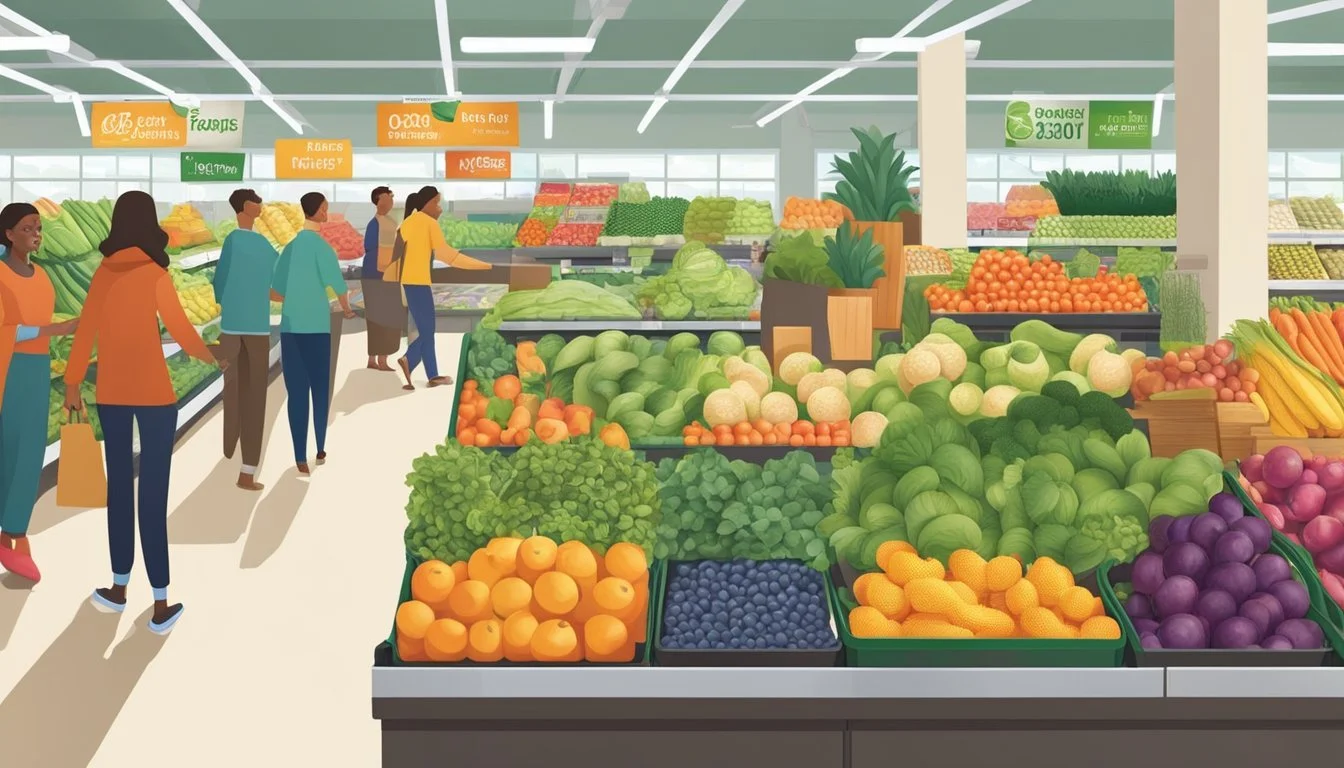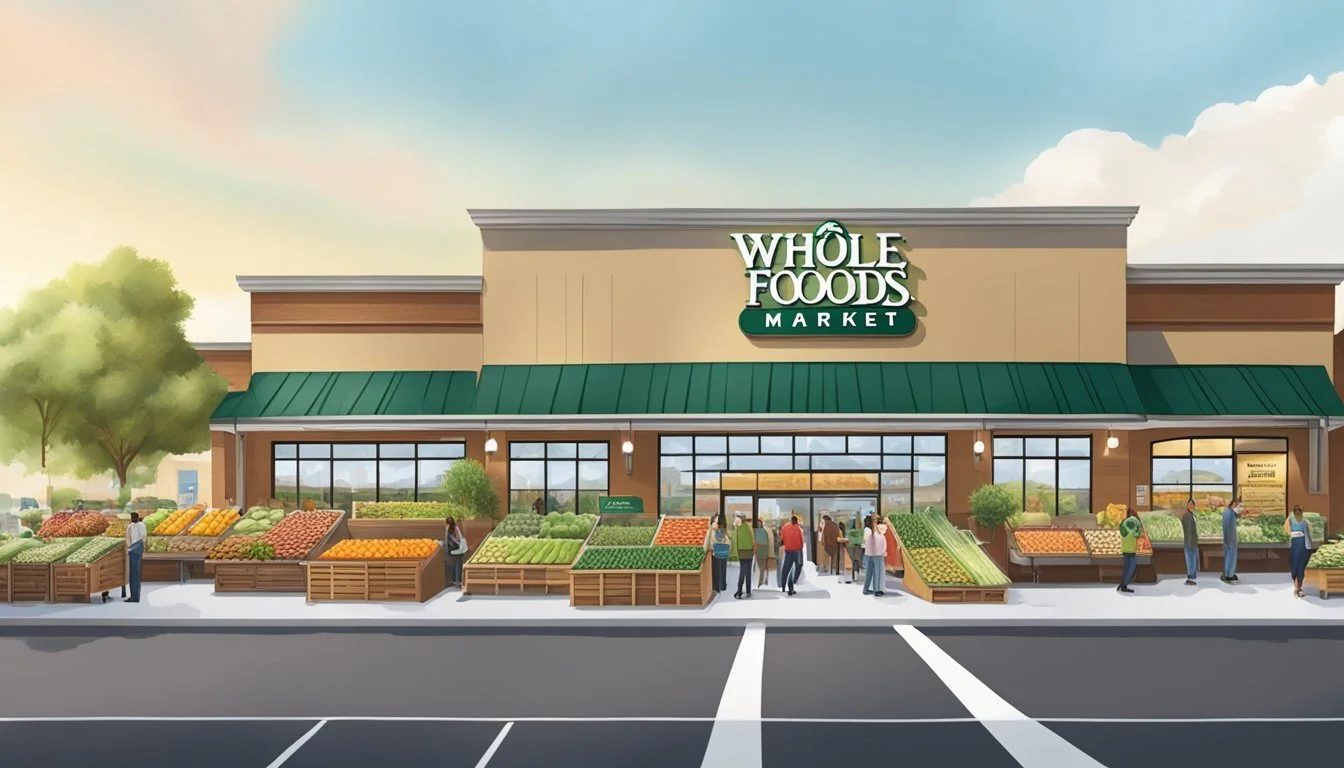Whole Foods Market vs Sprouts Farmers Market
Comparing Quality, Price, and Selection
Part of Our Grocery Store Guide with Details on Whole Foods Market Prices and Sprouts Farmers Market Prices
Whole Foods Market and Sprouts Farmers Market are two prominent players in the American grocery store landscape, especially revered by customers looking for organic and natural food options. Whole Foods, established in 1980, has grown into a large multinational company with over 500 stores across North America and the United Kingdom. It's widely recognized for its quality standards, eschewing products with artificial preservatives, colors, flavors, and sweeteners.
On the other hand, Sprouts Farmers Market, founded in 2002, has positioned itself as a neighborhood grocery store focusing on fresh, natural, and organic products at affordable prices. With over 300 stores, primarily in the United States, Sprouts emulates a traditional farmers market experience by providing an assortment of bulk foods, vitamins and supplements, and a fresh produce section that they claim is at the core of every store. Both stores offer a variety of products that appeal to a health-conscious demographic, yet they cater to different shopping experiences and budget considerations.
Company Backgrounds
The histories of Whole Foods Market and Sprouts Farmers Market trace the evolution of two leading grocery chains specializing in fresh, natural, and organic products. Both have cultivated loyal customer bases and have been influencial in the growing trend towards healthier grocery options.
Whole Foods Market History
Whole Foods Market began in 1980 when the first store was opened in Austin, Texas. The company was founded by John Mackey, Renee Lawson Hardy, Craig Weller, and Mark Skiles. Whole Foods was one of the pioneers in the supermarket movement focusing on natural and organic foods. It swiftly grew through the acquisition of numerous natural foods chains throughout the 80s and 90s. Its commitment to sustainable agriculture and high-quality products became a hallmark of the brand.
In 2017, Amazon acquired Whole Foods Market for $13.7 billion, marking a significant turn in the grocery store's history. This acquisition brought changes to the business model, including price cuts and integrating Amazon's technology and e-commerce capabilities into Whole Foods stores. The acquisition by Amazon was a clear indicator of Whole Foods Market's significant value and standing in the grocery market, both to consumers and investors.
Sprouts Farmers Market History
Sprouts Farmers Market was established in 2002, with its first store in Chandler, Arizona. It was founded by members of the Boney family, who had decades of experience in the grocery business. Sprouts has focused on providing a "farmers market experience," offering a large selection of fresh produce, bulk foods, vitamins and supplements, and natural meats.
Over the years, Sprouts Farmers Market has expanded significantly, with stores primarily in the southern and western United States. The chain emphasizes affordable pricing and targets health-conscious consumers looking for natural and organic food options without the typically high price tag. Their growth strategy has revolved around aggressive store expansion and capturing the interest of a fast-growing segment of the population that favors a healthy diet and lifestyle.
Business Models and Operations
In the competitive landscape of the grocery industry, Whole Foods Market and Sprouts Farmers Market distinguish themselves with unique business strategies focused on their approach to product offerings and market penetration, ultimately impacting their sales and revenue.
Whole Foods Market Strategy
Whole Foods Market targets the upscale market segment by offering a wide array of organic and natural products. Their strategy centers around high-quality standards, emphasizing non-GMO and sustainably sourced goods. The company invests in a robust supply chain that supports local and global organic farmers, which is a key factor in their competitive advantage.
Key Points:
Product differentiation: Whole Foods focuses on providing a diverse range of high-quality organic and specialty products.
Market segmentation: Targets consumers who prioritize quality, health, and environmental sustainability, often resulting in a higher price point.
Sales and revenue: Leverages premium product selection to achieve higher per-item profit margins, contributing to their revenue strength.
Sprouts Farmers Market Strategy
Sprouts Farmers Market adopts a more value-oriented approach in contrast to Whole Foods, aiming to make healthy living accessible to a broader customer base. Their model is akin to a farmers market, with a focus on fresh, natural, and organic products at competitive prices.
Key Points:
Affordability: Sprouts offers competitive pricing on its product range, which includes bulk foods, vitamins, and supplements, appealing to cost-conscious consumers.
Community engagement: Positioned as a neighborhood grocery store, Sprouts fosters a community-oriented atmosphere.
Sales and industry impact: The combination of affordability and quality garners a loyal customer base and exerts competitive pressure on similar industry players.
Both Whole Foods Market and Sprouts Farmers Market have distinct operational tactics that cater to different consumer preferences within the grocery industry. Their strategies reflect their branding objectives and influence their competitive standing and financial performance.
Product Selection and Quality
When comparing Whole Foods Market and Sprouts Farmers Market, product selection quality stands out as a significant factor. Both stores emphasize health with a focus on offering a range of organic and natural foods, but their approaches differ to some extent.
Organic and Natural Foods
Whole Foods Market:
Renowned for its commitment to organic and natural food options, Whole Foods does not sell products with artificial ingredients.
The store offers a wide variety of USDA-certified organic foods, catering to consumers who prioritize organic diets.
Sprouts Farmers Market:
While Sprouts also offers a selection of organic products, the store includes items that contain artificial ingredients.
Sprouts is often recognized for providing value in natural and organic food items, especially during sales and promotions.
Fresh Produce and Meat
Whole Foods Market:
Meat: Stocks a range of meats that are free from antibiotics and hormones.
Produce: Features an extensive selection of organic produce, which is a staple of their product offerings.
Sprouts Farmers Market:
Meat: Offers high-quality meat, including grass-fed and organic options, albeit with a potentially smaller selection.
Produce: Known for competitive pricing on conventional produce, while still maintaining a broad variety of organic produce.
Specialty Items and Private Labels
Whole Foods Market:
Specialty: Provides an abundance of gourmet specialty items that cater to food connoisseurs and those with dietary restrictions.
Private Labels: Owns a well-established private label, "365 by Whole Foods Market," offering budget-friendly, natural and organic options.
Sprouts Farmers Market:
Specialty: While Sprouts has less focus on gourmet items, it still offers a range of specialty products geared towards health-conscious consumers.
Private Labels: Features its private label products, which are known for being affordable while offering natural and organic choices.
Pricing and Value for Money
When consumers decide between Whole Foods Market and Sprouts Farmers Market, pricing plays a crucial role. Both stores focus on healthier food options, but they approach pricing differently, affecting overall value for money.
Comparing Product Prices
Whole Foods Market, often associated with higher pricing, positions itself as a premium grocery retailer with a commitment to all-natural and organic products. According to a Bank of America study, a basket of grocery items could cost more at Whole Foods than some competitors.
In comparison, Sprouts Farmers Market emphasizes affordability alongside its natural food selection. Consumers may find prices at Sprouts to be lower than Whole Foods on a variety of items. For example, organically grown produce and bulk items frequently have reasonable prices at Sprouts, which is a draw for price-conscious shoppers.
Deals and Discounts
Whole Foods Market offers discounts through various programs, notably for Amazon Prime members, which include special deals and an extra 10% off on sale items. Customers can find these discounted prices labeled in-store, acknowledging the dual benefits of membership rewards and sales promotions.
Sprouts Farmers Market is known for its regular promotions, deals, and discounts that make natural foods more accessible. They run weekly specials and offer a clearance section, advertised as "Vitamin Extravaganza" and "72-Hour Sales," providing opportunities for consumers to purchase products at an affordable price.
Both stores have their own approach to providing value for money through pricing strategies, with Whole Foods leaning towards premium service and Sprouts focusing on more budget-friendly options.
Shopping Experience
When comparing Whole Foods Market and Sprouts Farmers Market, customers often note differences in store layout, convenience, and the level of customer service. These factors contribute significantly to the shopping experience at each grocery store.
Store Layout and Convenience
Whole Foods Market tends to offer a modern and upscale environment. Their stores are typically large and well-organized, often with wider aisles. They provide a diverse array of products, including a sizeable selection of ready-to-eat meals, healthy hot food, and salad and juice bars. Customers appreciate the convenience of having a wide range of products, from grocery items to health and beauty products, under one roof.
Sprouts Farmers Market is reminiscent of traditional natural foods stores with an emphasis on fresh produce and bulk foods. The store layout is generally straightforward, making it easy for shoppers to navigate. Although Sprouts stores are often smaller than Whole Foods stores, many find them less overwhelming and quicker to shop in.
Customer Service and In-Store Facilities
At Whole Foods, customer service is a focal point, with staff often described as friendly and knowledgeable. Their in-store facilities, such as the hot bars and coffee stations, are prominent features praised by customers. Integrated services, including but not limited to Amazon Locker and Whole Foods Market’s partnership with Amazon for Prime member discounts, also enhance the customer service experience.
Sprouts Farmers Market is known for being approachable and community-focused, with a “neighborhood grocery store” feel. Employees at Sprouts are often commended for being courteous and helpful. While Sprouts may not have the extensive in-store dining options that Whole Foods does, they compensate with their commitment to customer satisfaction and hands-on assistance.
Each store has carved out a niche in customer experience, with Whole Foods leading in comprehensive service and Sprouts focusing on efficient, friendly shopping.
Market Presence and Expansion
In the competitive grocery market, store expansion and the modernization of shopping services such as online delivery are key indicators of a retailer's health and consumer appeal. Whole Foods Market and Sprouts Farmers Market manifest distinct strategies in these areas, showcasing their unique approaches to growth and customer convenience.
Store Locations and Growth
Whole Foods Market, established and well-known for its selection of organic and natural foods, operates around 500 store locations across the United States. Despite a mature market presence, Whole Foods continues to grow, albeit at a more cautious pace in recent years, with new store openings being selective and strategic.
In contrast, Sprouts Farmers Market, with its roots in California and a strong presence in states like Arizona and Texas, has rapidly expanded since its establishment in 2002. As of the end of 2023, Sprouts boasts 407 stores, showing robust growth with a focus on new store openings. Colorado and San Diego are notable regions where Sprouts has increased its market presence, indicating a strategic interest in health-conscious demographics. Their expansion strategy not only includes entering new markets but also bolstering performance in existing ones, which could be reflected in their same-store sales growth.
Online Shopping and Delivery Services
The prevalence of online shopping and delivery services has become a significant aspect of grocery retail, with both Whole Foods and Sprouts adapting to technology-driven consumer demands. Whole Foods partnered with Instacart to offer consumers the convenience of online shopping and expedited delivery services, ensuring that they maintain a competitive edge as e-commerce becomes more central to the grocery shopping experience.
Sprouts Farmers Market entices its customer base with an easy-to-use online platform for both pick-up and delivery options, staying competitive in a market that increasingly values convenience and efficiency. Their commitment to e-commerce is evident as they continue to invest in online shopping infrastructures to meet the evolving preferences of their customers. This focus on digital upgrades supports sustained growth and addresses the shift towards online consumer habits.
Sustainability and Community Impact
Whole Foods Market and Sprouts Farmers Market both emphasize sustainability and positive community impact, fostering relationships between consumers and food sources. Whole Foods's Impact Report highlights its multifaceted approach to sustainability, prioritizing food waste reduction, a lower carbon footprint, and conscious product sourcing. Their work veers towards creating a sustainable food ecosystem with a focus on non-GMO products and supporting local suppliers.
Sprouts Farmers Market brands itself on offering affordable, natural, and organic foods. They bring local produce from nearby farms to their stores, which can decrease carbon emissions due to shorter transportation distances. By connecting directly with their communities and forging a bond between farmers and consumers, Sprouts has fashioned a model that advocates for a mutual cycle of support.
Both stores contribute to sustainable food systems in their selection of products and engagement in environmentally friendly practices. However, their strategies differ slightly:
Whole Foods Market: Focused on broad sustainability efforts, including energy-efficient stores and comprehensive recycling programs.
Sprouts Farmers Market: Concentrates on the community aspect, promoting local farming and providing consumers with farm-fresh produce.
The approaches of Whole Foods and Sprouts to sustainability and their impact on the community stay true to their brand promises, aiming to make a difference and ensure the longevity of local produce and eco-friendly practices in the grocery industry.
Additional Services and Offerings
When comparing Whole Foods Market and Sprouts Farmers Market, their additional services and offerings play a significant role in the customer shopping experience. In particular, the variety and quality of deli and prepared foods, juice bars and vitamins, and the wine and beer selection stand out as key differentiators.
Deli and Prepared Foods
Whole Foods Market is renowned for its extensive deli and hot bar, offering a diverse range of gourmet prepared foods. Customers can find organic and locally-sourced options, with an emphasis on healthy and fresh meals. In comparison, Sprouts Farmers Market provides a selection of cold side dishes and packaged prepared foods. Their focus is on affordability, with meal solutions such as roasted chicken that are convenient for busy shoppers.
Juice Bars and Vitamins
Whole Foods Market includes in-store juice bars that serve up fresh, nutrient-packed juices and smoothies. Additionally, they offer an extensive variety of vitamins and supplements, with knowledgeable staff on hand to assist customers. Sprouts Farmers Market also features an emphasis on health with their variety of vitamins and supplements, catering to those interested in wellness and natural health products.
Wine and Beer Selection
For those with an affinity for fine wines and craft beers, Whole Foods Market presents a premium selection, including organic and gluten-free options. Their stores often feature beer and wine from local breweries and vineyards. Sprouts Farmers Market, while smaller in scale, offers a curated range of wine and beer, with an emphasis on value and affordability. Customers looking for a broad selection may prefer Whole Foods, while those seeking budget-friendly options might opt for Sprouts.
Financial Performance and Investor Information
When evaluating the fiscal health and appeal to investors, both Whole Foods Market and Sprouts Farmers Market present intriguing insights. Whole Foods Market, now a subsidiary of Amazon, has been synonymous with a high-margin operation, typically outperforming Sprouts Farmers Market in overall profitability. With a profit margin exceeding that of Sprouts', their financials reflect efficient operations and a robust pricing strategy.
Sprouts Farmers Market has shown a promising growth rate and an improving margin, demonstrating their adeptness in expanding their market reach and optimizing their business model. They have managed to progressively enhance their financial performance.
Both companies prioritize organic and health-conscious products, which appeals to a segment of consumers willing to pay a premium, thereby positively affecting net income. While specific financial figures evolve over time, potential investors are often interested in recent reports, such as Sprouts Farmers Market's financials which can be found in their Annual Reports:
2019 Annual Report: The company demonstrated resilience with a noteworthy net income.
2020 Annual Report: Indicated further growth, reflective of escalated consumer health awareness.
Investors also examine the stability and expertise of the board of directors since leadership deeply influences a company's strategic direction and financial outcomes. Both Whole Foods and Sprouts have experienced boards that are capable of navigating the companies through the competitive landscapes of specialty grocery retail.
Earnings, being a vital indicator of a company's profitability, are closely monitored. Sprouts, as mentioned in recent analyses, has been improving its earnings, a positive signal to investors. Whole Foods, benefited from the association with Amazon, also continues to maintain healthy earnings.
The juxtaposition of financial performance between Whole Foods and Sprouts is a comprehensive study, considering both have their unique strengths and strategies shaping their investment narratives.
Customer Loyalty and Marketing
In the competitive grocery market, both Whole Foods Market and Sprouts Farmers Market deploy strategic marketing efforts to foster customer loyalty and keep shoppers returning.
Loyalty Programs and Promotions
Whole Foods Market, since its acquisition by Amazon, has integrated its customer loyalty program with Amazon Prime. Prime members enjoy exclusive discounts on select products and can access savings with the Whole Foods app at checkout. To cater to a grocery budget-conscious audience, Whole Foods also promotes weekly deals and discounts on a variety of items.
Discounts for Amazon Prime Members
Exclusive discounts on select items
Additional savings via the Whole Foods app
On the other hand, Sprouts Farmers Market often runs promotions and deals to attract and retain customers. Shoppers can benefit from their Vitamin Extravaganza and other thematic sales, like the "72-Hour Sale," where specific products are heavily discounted.
Regular Promotions
Vitamin Extravaganza: Discounts on health and wellness products
72-Hour Sale: Limited-time discounts on select items
Newsletter Services and Advertising
Both chains utilize newsletter services to keep their customers informed and engaged. Whole Foods Market sends out a newsletter that includes recipes, upcoming sales, and information about their quality standards. It is a tool they use to not only keep customers informed but also to emphasize their commitment to natural and organic foods.
Sprouts Farmers Market leverages its website and the Sprouts app to share current promotions, store events, and healthy lifestyle tips. Their newsletters can be personalized based on preferences, ensuring that customers receive relevant information that may influence their shopping decisions and grocery budget.
Newsletter Content
Whole Foods Market: Recipes, sales events, quality standards
Sprouts Farmers Market: Promotions, store events, health tips
By utilizing various marketing strategies focused on loyalty programs and digital outreach, both Whole Foods and Sprouts aim to cultivate a personalized and rewarding shopping experience for their customers.
Conclusion
When choosing between Whole Foods Market and Sprouts Farmers Market, consumers must consider several factors. Whole Foods Market boasts a more extensive selection with a reputation for quality. The chain prides itself on not selling products with artificial ingredients. On the other hand, Sprouts Farmers Market offers an experience reminiscent of traditional health-focused stores, appealing to those who favor a more classic approach to health-oriented shopping.
Product Availability
Whole Foods: Larger variety, hot food options, juice bars.
Sprouts: Focus on produce, bulk foods, vitamins.
Pricing
Whole Foods: Known to be pricier overall, yet offers competitive pricing on certain items.
Sprouts: Frequently offers promotions and discounts, potentially more affordable.
Store Experience
Whole Foods: Modern shopping environment, extensive services.
Sprouts: Homely and traditional feel, resembling earlier health food stores.
Shoppers concerned with a wider array of organic and health-conscious options might lean towards Whole Foods Market. However, those looking for specific deals or a homier atmosphere may prefer Sprouts Farmers Market. Each store has attributes that cater to different consumer needs within the health-focused grocery niche. What dictates their decision should be individual preferences for product range, store ambiance, and price sensitivity.











